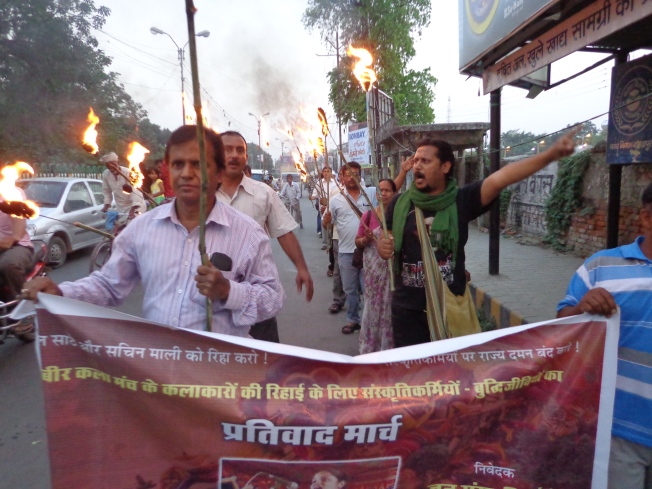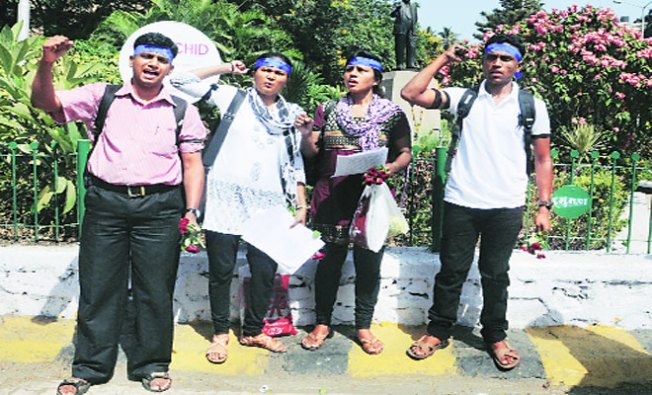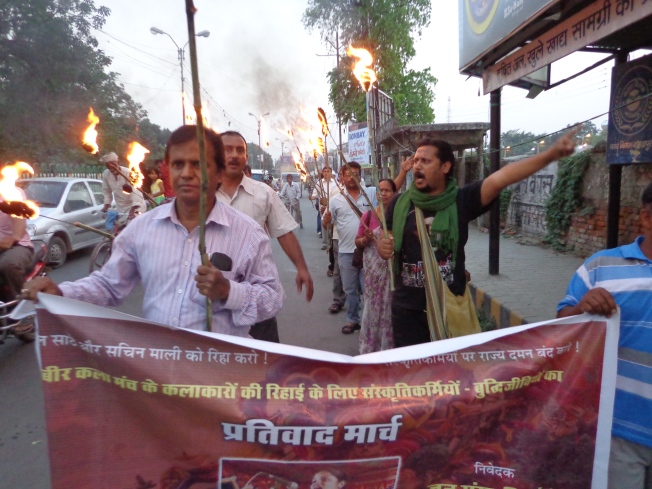The arrest of Sheetal Sathe and Sachin Mali of the KKM has brought this ongoing controversy back to the real issue at stake — the freedom of cultural and political expression, who these freedoms extend to and whom they ignore, writes Bhanuj Kappal
 |
ay 6, a sweltering Monday afternoon. A small crowd of reporters and activists have gathered near the Dr B. R. Ambedkar statue at Oval Maidan, Mumbai. Their attention is focused on four singers with blue bandanas performing protest songs and handing out copies of their latest album – a collection of protest music that touches on a range of issues such as caste and class oppression, gender equality, land redistribution and environmental exploitation. Sagar Gorkhe, Ramesh Gaichor, Jyoti Jagtap, and Rupali Jadhav are members of Pune-based cultural troupe Kabir Kala Manch (KKM), who are wanted by the Anti-Terrorist Squad (ATS) for alleged links to a banned Naxalite organisation. They are here to give themselves up. A few weeks earlier, their fellow cultural activists Sachin Mali and Sheetal Sathe had courted arrest, and were taken into police and judicial custody respectively. What follows is a farce. The ATS, which has been hounding their friends and family for almost two years, fails to show up. The bemused activists march to Mantralaya to surrender to Home Minister R.R. Patil, only to be told that they will have to wait. There is still no sign of the ATS. After a long wait, they finally meet the minister, whom they greet with a rendition of ‘Laal Salaam’. Mr. Patil listens to their concerns, and assures them that there will be no torture. Eventually, he has to call up the ATS and inform them that the activists they have been hunting are sitting in his office. Four hours after coming out of hiding, Sagar Gorkhe and Ramesh Gaichor are taken into custody, while their wives Jyoti Jagtap and Rupali Jadhav are allowed to go home. Earlier, the four singers joke about what they’ll do if nobody turns up to arrest them. But behind the laughter is real concern, and a steely determination to stand up for their rights. They have been hiding from the police ever since KKM members Deepak Dengle and Siddharth Bhonsle were arrested in 2011 along with six other activists for alleged Naxal links. They have had little to no contact with their families. “The police went to Rupali’s mother and told her that Rupali had been killed in an encounter,” says Jagtap. “She has health problems, and she fainted on hearing this.” Kabir Kala Manch is not unique in being targeted by the police and being branded as Naxalites, but their story is an example of how the Indian state is increasingly clamping down on anti-establishment speech and expression.
The story begins in 2002, when a group of mostly Dalit students and young professionals from Pune came together in the wake of the Gujarat riots. Some of them, such as Sachin Mali, were activists who had participated in the short-lived but influential Vidrohi cultural movement. For others, such as Sheetal Sathe and Sagar Gorkhe, who used to be religious singers, this was an initiation into radical politics. Influenced by the 19th century reformer Jyotirao Phule, and contemporary Dalit-left singers Vilas Ghoghre and Sambhaji Bhagat, they started performing their politically-charged music and theatre in the slums and streets of Pune. They were very disturbed by the Gujarat riots,” says Sambhaji Bhagat, who regularly interacted with the group. “Then Khairlanji happened, and that was a terrible case. Nobody can bear atrocities like that. They started singing about the genocides and massacres. Being Dalits who came from the jhopadpattis [ghettos] of Pune, they knew the reality of life for thousands of people under oppression. Unlike the middle class, who come to know the reality [of oppression] through ideology, they came to ideology through this reality.” Kabir Kala Manch’s music is part of a long tradition of Dalit protest music and poetry, dating all the way back to the Satya Shodhak Samaj‘s political tamashas in the 19th century [a traditional performance mixing music, satire and theatre]. Their music and politics is also influenced by Left-leaning musical groups like the Red Flag Cultural Squad, comprising of Annabhau Sathe, D.N. Gavankar and Amar Sheikh.
“They’re basically a combination of Ambedkarite thought and Marxism,” says documentary film-maker Anand Patwardhan, whose last film Jai Bhim Comrade discussed the present plight of the KKM extensively. “It’s a mixture of two philosophies that seemingly don’t mix, but in their work they get integrated. They’re raising the issue of caste in the Left movement and the issue of class in the Ambedkarite movement.” By 2007, KKM was travelling and performing in slums and villages all across Maharashtra. Their popularity grew because of their passionate and poignant performances, and the issues that they raised. Lead singers Sheetal Sathe and Sagar Gorkhe are both talented singers and songwriters, and their performances would often leave the audience in tears. “It’s not just the politics, it’s the art itself,” adds Patwardhan. “Sheetal is a wonderful singer, she has a voice that can move anybody. Sachin’s poetry is also very moving. In the political sphere, you rarely come across such good musicians, people with such command over musical skills as well.” But with growing popularity came the scrutiny of the State. And when their songs grew more militant, the police swung into action. As mentioned earlier, KKM members Deepak Dengle and Siddharth Bhonsle were arrested from Pune in 2011, along with five other activists, and charged under the Unlawful Activities (Prevention) Act. The others went into hiding. Legal advisor Susan Abraham says: “The charges against them are that they were organising students and workers, and participating in struggles with the aim of building up support for CPI-Maoist.” She adds that this isn’t the first time that the government has targeted singers and cultural activists, citing Shantanu Kamble and Sudhir Dhawale as examples. Both the Kabir Kala Manch and its defenders admit that their music became more militant in response to increasing atrocities against the Dalits and other marginalised sections of society, though they deny that they are Naxalites. They argue that in a mature democracy singing songs of rebellion should not be a crime. What is the right to freedom of speech and expression if it does not include freedom to dissent? Activist Vivek Sundara says: “The state has gone beyond targeting active Naxalites. Now anyone, even a cultural activist, who is against the State and speak out about rights is being targeted. By all accounts, these people have committed no acts of violence. They’re radicals, but they’re only singing and speaking.” RR Patil with Anand Pathwardhan, Prakash Ambedkar and the four accused “Our democracy would be a dry democracy, or a fascist state, if we arrest people who sing songs on the basis of mere suspicion,” adds Patwardhan. “The irony is that I’ve made a film featuring these militant songs, and that got a National Award. So it depends on which class and caste you belong to. These people have court cases against them, and I have a National award.” Their arguments have found support in a recent High Court ruling by Justice Abhay Thipse, which granted bail to Deepak Dengle and Siddharth Bhonsle along with two others who were charged in the same case. Justice Thipse ruled that “suspects could be sympathisers of Maoist philosophy but none can be said to be active members of banned CPI (Maoist)”. Emboldened by this ruling, KKM members are now coming out in full public glare to submit themselves to legal questioning and the due process of the law. They hope to get bail quickly, and believe that a fair trial will lead to their acquittal. They have no illusions about the police and the judiciary, but are determined to fight it out no matter how long it takes. “We want the freedom to go to andolans and morchas hand in hand with the people,” says Gorkhe. “Our songs are our strength. All our ideas, we put in our songs and present them to people.” As the four activists walk to the police station where they will wait for their meeting with the Home Minister, a journalist asks Rupali Jadhav if they have anything they want to say to the police. She replies: “We’ll sing them our songs. After all, that is what we do.” |
Related articles
- The thin line between dissent and rebellion- Kabir Kala Manch (kabirkalamanch.wordpress.com)
- Statement – Kabir Kala Manch Satyagraha (kabirkalamanch.wordpress.com)
- India – That shrinking space for dissent #Protest (kabirkalamanch.wordpress.com)
- AISA – In Solidarity with Kabila Kala Manch (kabirkalamanch.wordpress.com)
- India – Democracy needs their song- Kabir Kala Manch (kabirkalamanch.wordpress.com)


 —
—  Anand Pathwardhan and the four accused contemplate their next move after being shooed away from Mantralaya on May 6 |Photos: Kashish Parpiani
Anand Pathwardhan and the four accused contemplate their next move after being shooed away from Mantralaya on May 6 |Photos: Kashish Parpiani




